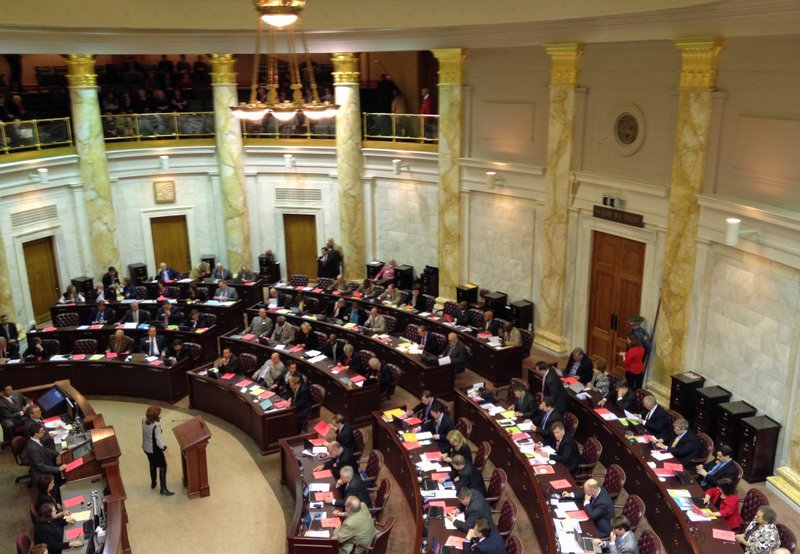Hot-button bills swept through the Arkansas House on Monday with overwhelming support, but Gov. Mike Beebe's office is taking its time to consider whether some of those bills can stand up to the Constitution.
Representatives approved a bill titled The Church Protection Act of 2013 on Monday, 85-8, to permit concealed handguns in churches and other houses of worship.
The bill, which was approved by the the Arkansas Senate last week in a 28-4 vote, would allow places of worship in Arkansas to decide whether to allow concealed weapons on the property.
Rep. Nate Bell, R-Mena, explained the bill and responded to some concerns raised by its opponents. Bell said the bill does not remove all churches from the list of prohibitive places — noting if an individual church does not want concealed weapons on its property, nothing changes.
Bell said the bill is meant to provide an exemption for churches who cannot afford to hire paid security.
Some opponents have also expressed concern that the bill would result in increased insurance rates for the participating churches. Bell said those churches should have nothing to worry about, citing around 40 states with similar bills.
"There is no logical reason that insurance companies would single out Arkansas churches when they have not in other states," Bell said.
The legislation will now go back to the Senate for a vote to approve the addition of new sponsors to the bill, originally sponsored by Sen. Bryan King, R-Green Forest.
Matt DeCample, a spokesman for Gov. Mike Beebe, said Monday before the vote that the governor still plans to sign the bill, but that he "also plans on working with legislators to come up with additional language to provide some protection for the churches."
The House also passed two bills dealing with abortion Monday afternoon.
HB 1037, referred to as the Pain-Capable Unborn Child Protection Act, passed the House by a vote of 75-20. If signed into law, the bill would ban most abortions after 20 weeks of pregnancy.
Rep. Andy Mayberry, R-Hensley, said the studies have shown that 20 weeks was the point a fetus was capable of feeling pain.
The bill does not include an exception for cases of rape or incest, which drew criticism from Rep. Greg Leding, D-Fayetteville.
Standing before his fellow representatives, Leding admitted it was hard to stand in opposition but said he would vote against the bill because no exception was made for rape, incest or the fetal condition. Leding went on to say that he and other members who voted against the bill did not do so out of lack of compassion, faith or regard and respect for life.
"The decision should be left to the mother, father, doctor and their god," Leding said.
Mayberry responded to Leding's criticism of no exceptions in the bill for rape or incest by saying the fetus should not be held responsible.
"That child still had nothing to do with that act," Mayberry said. "That child shouldn't be asked to pay the ultimate price with their own life."
HB 1100 — a bill that would prohibit insurance policies from providing coverage for abortions except in cases of rape, incest or the well-being of the mother — passed the House in a 77-15 vote.
Both bills now head to a Senate committee.
The Senate approved Senate Bill 134 last Thursday, sponsored by Sen. Jason Rapert, R-Bigelow, which would ban abortions as early as six weeks.
Beebe said his office is also researching the legality of HB 1037 and HB 1100.
Read Tuesday's Arkansas Democrat-Gazette for full details.
